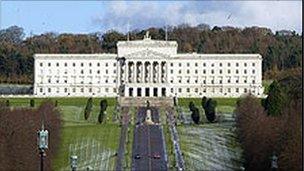Unique circumstances still exist for NI Assembly
- Published
At first glance the debates likely to dominate Northern Ireland's 2011 assembly elections look much the same as those raging elsewhere in Britain and Ireland: the economy, jobs, cuts in public services and the future of the health and education systems.
But look more closely and you will notice the peculiarities and constraints within which these debates are held.
Like Scotland and Wales, Northern Ireland has a regional administration, not a national government.
So rather than set its own balance between taxes and spending, it must operate within the financial allocation granted by Westminster.
Moreover, the system of government designed under the Good Friday and St Andrews agreements imposes limits on how the parties can approach the issues.
There's no government to be thrown out or opposition to be installed.
And if voter A takes a fancy to party B's policies on, say, the environment, they might give them a first preference vote only to see party C appointed to that portfolio under the proportional handout of ministries.
What will be more muted than ever before - if not entirely missing - are the constitutional concerns which have dominated past campaigns.
The anti-power sharing Traditional Unionists still regard Sinn Fein as unfit for government.
But the mainstream unionists now accept republicans as part of the inevitable equation - even if they want changes in the system and don't relish the prospect of Martin McGuinness one day becoming first minister.
On the nationalist side, anti-agreement dissidents aren't standing - a reflection of their tiny electoral support, but also a sign of their rejection of what they regard as the "partitionist" Stormont assembly.
As the campaign got going, however, bomb alerts served as a reminder of their existence. By contrast, Sinn Fein - fresh from its success in the Irish Republic's general election - will portray itself as the only republican force making real inroads on an-all Ireland basis.
Budget divisions
When it comes to cuts and the economy, the Stormont executive parties are divided over the recent budget, with the DUP, Sinn Fein and the Alliance voting yes and the Ulster Unionist and SDLP "opposition within" voting no.
Expect arguments about that, with the two anti-budget parties accusing the bigger ones of passing on Westminster cuts and the bigger ones responding by portraying their opponents as reckless opportunists.

The Northern Ireland Assembly operates under rules which distinguish it from the rest of the UK.
In particular the DUP will try to use the Ulster Unionists' links with the Conservatives to undermine their anti-budget arguments.
There's widespread agreement that Northern Ireland's economy is too dominated by the public sector.
On the eve of the campaign all five Stormont parties shared a stage with Secretary of State Owen Paterson to back a consultation paper which raised the prospect of a cut in local corporation tax in a bid to attract more foreign investment.
So the main parties will echo each other on this, even though the move has drawn criticism from the trade unions, Greens and left-wing parties who view it as a tax break for business at the expense of public services.
The Traditional Unionists are also unconvinced about giving Stormont extra powers over taxation, worried that fiscal independence could be the thin end of the wedge for political independence.
The state of the water service was a big talking point over the winter, with thousands losing their supply as a result of the rapid thaw which followed the icy Christmas.
Of the five Stormont parties only Alliance backs the introduction of separate water charges.
But there's likely to be debate over Sinn Fein's plan to return the service to full public ownership and others' support for NI Water becoming a mutually owned company.
Given their previous stewardship of the health service, the Ulster Unionists may hope to score some points, by calling for a bigger slice of the local budget for the NHS.
But the outgoing minister's last minute decision not to press ahead with a radio therapy centre in the North West is an emotive local issue the other parties believe they can exploit.
Education continues to rankle, with many parents dissatisfied about the handling of academic selection under Sinn Fein's ministerial guidance.
Unionists have opposed Sinn Fein on this, although a recent report highlighted the current system's failure to raise standards in Protestant working class areas.
Tuition fees
The level of future university tuition fees remains a concern, even though the former Ulster Unionist minister tried to defuse the issue by delaying a decision.
The Ulster Unionists have called for major reforms to the Stormont system, to allow for the agreement of a programme for government before ministers are appointed and an eventual move towards a system built around a government and an opposition.
Sinn Fein has already indicated it will veto any move which it sees as an attempt to exclude it from power.
The Traditional Unionists will continue to launch broadsides against the all-inclusive "mandatory coalition" model.
The SDLP don't believe the system is bust, blaming instead what they regard as the "carve up" behaviour of the bigger parties.
The DUP is likely to push its own ideas for reform, including a cull of both the number of Stormont departments and various arms length commissions.
With a council election alongside the assembly contest, the previous executive's failure to push through plans to cut the existing 26 local councils to 11 may also feature in the mix.
The talk of administrative reform will probably grab the politicians' and pundits' attention more than that of the general public.
However one of the ironies is that, in the absence of reform, the ability of the parties to deliver real change when it comes to the "bread and butter issues" will remain as limited after this election as it has been in previous contests.